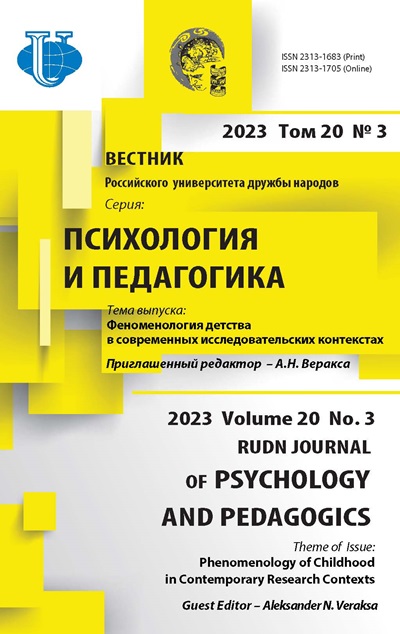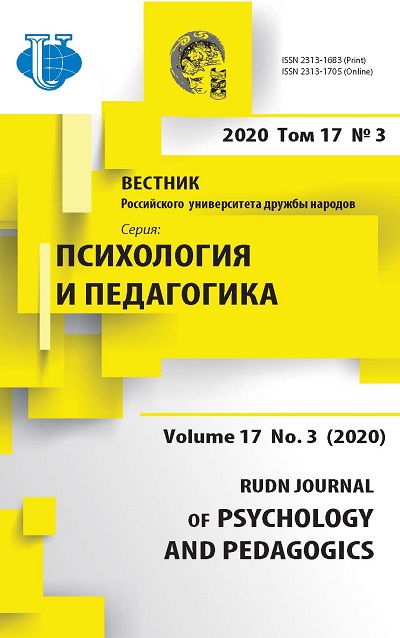Patterns of Discussion of Current Events by Internet Users: Case Study of Runet Sites
- Authors: Pavlova N.D.1, Afinogenova V.A.1, Grebenschikova T.A.1, Zachesova I.A.1, Kubrak T.A.1
-
Affiliations:
- Institute of Psychology of Russian Academy of Sciences
- Issue: Vol 17, No 3 (2020)
- Pages: 504-520
- Section: SOCIAL PSYCHOLOGY IN CULTURAL DIMENSIONS
- URL: https://journals.rudn.ru/psychology-pedagogics/article/view/24717
- DOI: https://doi.org/10.22363/2313-1683-2020-17-3-504-520
Cite item
Full Text
Abstract
The article deals with the problem of network discussions representing the new social reality of modern digital society. Communicative online activity sets an idea of what is happening, stimulating interest in the study of post-event Internet discourse. It is noted that the dominant role in this communication environment is played by the focus on promoting one’s own world view and suppressing the activity of other users. This work continues a series of studies aimed at concretising these ideas. In previous studies conducted using the method of intent analysis, it was found that, in the process of discussion, there is a modification of referential objects and a shift in the intentional composition of discourse relative to the initial presentation of the event. In addition to it, differences in the types of post-event discourse were found in terms of the degree of conflict, the composition of intentions, etc. Verification of the revealed patterns associated with the intentional space of post-event discourse was the goal of the study carried out on the material of the discussion of the same event at different sites, i.e. the refusal of Prince Harry and Meghan Markle from the status of members of the royal family. According to the data obtained, a significant modification is confirmed during the discussion of referential objects and the intentional content of discourse regarding the received message: additional reference objects appear, their meaning is blurred, the number of categories of intentions increases many times with the increase of numerous emotionally coloured intentions. At the same time, a shift towards intentions of distancing and discrediting is revealed in relation to most of the discussed thematic objects. The discussion develops mainly due to the focus of users on the comments of interlocutors and the corresponding interactive objects, which is associated with the high dialogueness of post-event discourse. The data obtained allow us to advance in studying the discussion of events by Internet users and understanding which characteristics of the post-event Internet discourse are stable, and which are modified in connection with the leading function, theme, etc.
About the authors
Natalya D. Pavlova
Institute of Psychology of Russian Academy of Sciences
Author for correspondence.
Email: pavlova_natalya@mail.ru
Doctor Sc. of Psychology, is Head of the Laboratory of Psychology of Speech and Psycholinguistics
13 Yaroslavskaya St, bldg 1, Moscow, 129366, Russian FederationVictoriya A. Afinogenova
Institute of Psychology of Russian Academy of Sciences
Email: viktoriyamail87@mail.ru
Ph. D. in Psychology, is senior researcher of the Laboratory of Psychology of Speech and Psycholinguistics
13 Yaroslavskaya St, bldg 1, Moscow, 129366, Russian FederationTaisiya A. Grebenschikova
Institute of Psychology of Russian Academy of Sciences
Email: gretiya@mail.ru
Ph. D. in Psychology, senior researcher of the Laboratory of Psychology of Speech and Psycholinguistics
13 Yaroslavskaya St, bldg 1, Moscow, 129366, Russian FederationIrina A. Zachesova
Institute of Psychology of Russian Academy of Sciences
Email: zachiosova-2004@mail.ru
Ph. D. in Psychology, senior researcher of the Laboratory of Psychology of Speech and Psycholinguistics
13 Yaroslavskaya St, bldg 1, Moscow, 129366, Russian FederationTina A. Kubrak
Institute of Psychology of Russian Academy of Sciences
Email: kubrak.tina@gmail.com
Ph.D. in Psychology, senior researcher of the Laboratory of Psychology of Speech and Psycholinguistics
13 Yaroslavskaya St, bldg 1, Moscow, 129366, Russian FederationReferences
- Afinogenova, V.A., & Pavlova, N.D. (2016). Intencional'nye kategorii povsednevnogo diskursa v studencheskoj srede. In A.L. Zhuravlev, N.D. Pavlova & I.A. Zachesova (Eds.), Psikhologiya Diskursa: Problemy Determinatsii, Vozdeistviya, Bezopasnosti (pp. 102–127). Moscow: Institut psikhologii RAN Publ. (In Russ.)
- Bastos, M.T., Mercea D., & Charpentier, A. (2015). Tents, tweets, and events: The interplay between ongoing protests and social media. Journal of Computer-Mediated Communication, 65(2), 320–350. https://doi.org/10.1111/jcom.12145
- Benamar, L., Balague, C., & Ghassany, M. (2017). The identification and influence of social roles in a social media product community. Journal of Computer-Mediated Communication, 22(6), 337–362. https://doi.org/10.1111/jcc4.12195
- Flejs, Dzh. (1989). Statisticheskie Metody dlja Izuchenija Tablic Dolej i Proporcij. Moscow: Finansy i statistika Publ. (In Russ.)
- Gradoselskaya, G., & Pilgun, M. (2015). Communicative Processes in the Network Environment: The Interdisciplinary Analysis of Politically Active Communities on Facebook. Journal of Psycholinguistics, 26(4), 44–58. (In Russ.)
- Grebenshchikova, T.A., Pavlova, N.D., & Afinogenova, V.A. (2016). Modifikatsiya intentsional'nogo prostranstva v postsobytiinom internet-diskurse. In A.L. Zhuravlev, N.D. Pavlova & I.A. Zachesova (Eds.), Psikhologiya Diskursa: Problemy Determinatsii, Vozdeistviya, Bezopasnosti (pp. 201–219). Moscow: Institut psikhologii RAN Publ. (In Russ.)
- Grebenshhikova, T.A., & Pavlova, N.D. (2019). Patriotic discourse in the political internet community. Journal of Psycholinguistics, 42(4), 34–49. (In Russ.)
- Grebenshhikova, T.A., Pavlova, N.D., & Afinogenova V.A. (2018). Razlichija intencional'nogo soderzhanija postsobytijnogo diskursa i diskursa foruma v internete. In R.V. Ershova (Ed.), Cifrovoe Obshhestvo kak Kul'turno-Istoricheskij Kontekst Razvitija Cheloveka (pp. 122–127). Kolomna: GSGU Publ. (In Russ.)
- Heirman, W., Angelopoulos, S., Wegge, D., Vandebosch, H., Eggermont, S., & Walrave M. (2015). Cyberbullying-entrenched or cyberbully-free classrooms? A class network and class composition approach. Journal of Computer-Mediated Communication, 20(3), 260–277. https://doi.org/10.1111/ jcc4.12111
- Kirilina, A.V. (2015). The Internet Genre of “Reader Comments”. Vestnik of Moscow City University. Philology. Theory of Linguistics. Linguistic Education, 17(1), 67–76. (In Russ.)
- Kolokol'ceva, T.N., & Lutovinova, O.V. (Eds.) (2012). Internet-Kommunikatciya kak Novaya Rechevaya Formatciya. Moscow: Flinta Publ., Nauka Publ. (In Russ.)
- Kubrak, T.A. (2019). Post-event cinema discourse: Concept, functioning, case study. RUDN Journal of Psychology and Pedagogics, 16(4), 600–617. http://dx.doi.org/10.22363/2313-1683-2019-16-4-600-617
- Kuryanovich, A.V. (2018). Experience of linguistic and legal personality characteristics of conflict language personality (on the example of analysis of communicative behavior of troll in the network correspondence). Tomsk State Pedagogical University Bulletin (TSPU Bulletin), 2(191), 127–142. (In Russ.)
- Mahfouz, I.M. (2018). The representation of Meghan Markle in Facebook posts: A discourse historical approach (DHA). International Journal of Language and Linguistics, 5(3), 246–259. https://doi.org/10.30845/ijll.v5n3p24
- Nordas, A., & Ottosson, M. (2019). The British Media Portrayal of an “American Royal”. A critical discourse analysis of the articles published by the British press covering the Duchess of Sussex during the Royal Africa tour 2019. Jonkoping University.
- Pavlova, N.D., & Grebenshhikova, T.A. (2017). Intent-analiz postsobytiinogo diskursa v Internete. Psihologicheskie Issledovanija, 10(52), 8. (In Russ.)
- Pavlova, N.D., & Grebenshhikova, T.A. (2017). Intent-analiz. Osnovaniya, Procedura, Opyt Ispol'zovaniya. Moscow: Institut psikhologii RAN Publ. (In Russ.)
- Pavlova, N.D., Grebenshhikova, T.A., Afinogenova, V.A., Zachesova, I.A., & Kubrak, T.A. (2020). Intencional'noe prostranstvo postsobyti[nogo diskursa na razlichnyh internet-ploshhadkakh. Psihologicheskij Zhurnal, 41(3), 78–91. https://doi.org/10.31857/S020595920009327-5 (In Russ.)
- Popova, D.A. (2014). Kognitivno-diskursivnaja model' Internet-diskursa. Vestnik Irkutskogo Gosudarstvennogo Tehnicheskogo Universiteta, 7(90), 223–226. (In Russ.)
- Radina, N.K. (2016). Intent-analiz onlain-diskussii (na primere kommentirovaniya materialov internet-portala InoSMI.ru). Mediaskop, (4). Retrieved from http://www.mediascope.ru/2238 (In Russ.)
- Ribot, A.F. (2019). A Linguistic Analysis of the Representation of Kate Middleton and Meghan Markle in the British Press: A Corpus-Based Study. University of the Balearic Islands.
- Romantovskij, A.V. (2015). Metakommunikativnye indeksy v diskurse internet-kommentariev. Vestnik Leningradskogo Gosudarstvennogo Universiteta imeni A.S. Pushkina, 1(3), 141–149. (In Russ.)
- Ryzhkov, M.S. (2012). Rechevye strategii i taktiki internet-kommunikacii (na materiale chatov). In T.N. Kolokol'ceva & O.V. Lutovinova (Eds), Internet-kommunikacija kak Novaja Rechevaja Formacija (pp. 72–87). Moscow: Flinta Publ. (In Russ.)
- Santana, A.D. (2014). Virtuous or vitriolic: The effect of anonymity on civility in online newspaper reader comment boards. Journalism Practice, 8(1), 18–33.
- Sergeeva, A.S., Kirillov, B.A., & Voronina, E.Ju. (2016). Kommentarii kak forma diskursa professional'nogo virtual'nogo soobshhestva (na primere IT). In A.L. Zhuravlev, N.D. Pavlova & I.A. Zachesova (Eds.), Psihologija Bezopasnosti Diskursa: Problemy Determinacii, VozDejstvija, Bezopasnosti (pp. 84–102). Moscow: Institut psikhologii RAN Publ. (In Russ.)
- Sidorova, I.G. (2011). Pragmatic communication characteristics of personaland interpersonal genres in the internet discourse. Science Journal of VolSU. Linguistics, 14(2), 154–159. (In Russ.)
- Simoes, E. (2019). “Long live Harry and Meghan!”: An analysis of polite and aggressive argumentation strategies from online forums on celebrity-related news. Journal of Discourse Studies, (8), 156–178. https://doi.org/10.21747/21833958/red8a7
- Stroud, N.J., Scacco, M.J., Muddyman, A., & Curry, A.L. (2015). Changing deliberative norms on news organizations’ Facebook sites. Journal of Computer-Mediated Communication, 20(2), 188–203. https://doi.org/10.1111/jcc4.12104
- Sutherland, K.E. (2016). Using propinquital loops to blend social media and offline spaces: A case study of the ALS Ice-Bucket Challenge. Media International Australia, 160(1), 78–88. https://doi.org/10.1177/1329878x1665113
- Theocharis, Y., Vitoratou, S., & Sajuria, J. (2017). Civil society in times of crisis: understanding collective action dynamics in digitally‐enabled volunteer networks. Journal of Computer-Mediated Communication, 22(5), 248–265. https://doi.org/10.1111/jcc4.12194
- Ushakova, T.N., Pavlova, N.D., Alekseev, K.I., Latynov, V.V., & Cepcov, V.V. (2000). Slovo v Dejstvii. Intent-analiz Politicheskogo Diskursa. Saint Petersburg: Aletejja Publ. (In Russ.)
- Woong Yun, G., Park, S.-Y., Holody, K., Yoon, K.S., & Xie, S. (2013). Selective moderation, selective responding and balkanization of the blogosphere: A field experiment. Media Psychology, 16(3), 295–317.
















